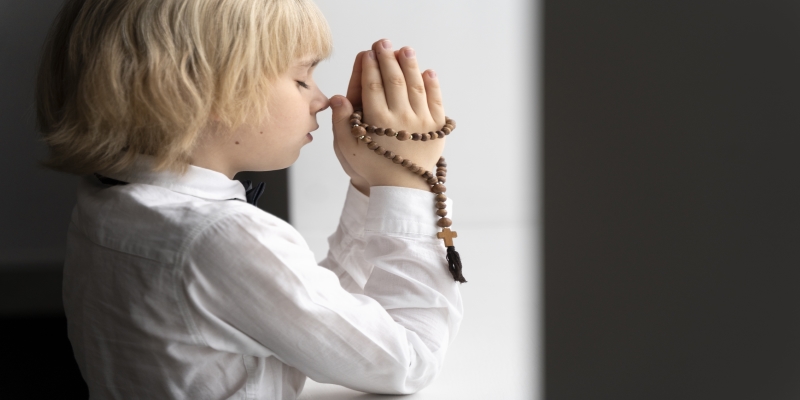
6 Spiritual Practices To Develop Emotional Resilience
 Mental Health & Spiritual Healing
Mental Health & Spiritual Healing Emotional resilience refers to the ability to bounce back from adversity, stress, and difficult life situations. It is a quality that allows people to handle setbacks with a sense of calm and confidence, maintaining their emotional stability despite challenges.
Emotional resilience refers to the ability to bounce back from adversity, stress, and difficult life situations. It is a quality that allows people to handle setbacks with a sense of calm and confidence, maintaining their emotional stability despite challenges. Spiritual practices, while diverse in form and expression, offer powerful tools to build and nurture emotional resilience. Whether through meditation, mindfulness, prayer, or other spiritual activities, these practices help individuals manage emotions, cope with stress, and build inner strength. This article examines the various ways in which spiritual practices can help develop emotional resilience.
The Connection Between Emotional Resilience And Spirituality
At its core, emotional resilience is about maintaining a healthy emotional state even during tough times. It involves qualities like optimism, perseverance, and the ability to manage emotions healthily. Spirituality, though often associated with religion, encompasses a broad range of practices and beliefs that foster a deeper sense of connection to oneself, others, and the universe.
Many spiritual practices encourage individuals to reflect on their values, purpose, and place in the world. By cultivating a sense of meaning and understanding, these practices help people maintain a balanced emotional state even when life gets difficult. Spirituality can provide a sense of comfort and security, especially in the face of uncertainty or loss. For many, spirituality offers the assurance that they are part of something greater, giving them the strength to face challenges with courage and hope.
Meditation And Mindfulness: Tools For Emotional Balance
Meditation and mindfulness are two spiritual practices that have gained widespread popularity for their ability to enhance emotional resilience. These practices help individuals develop greater self-awareness and emotional control by teaching them to focus on the present moment, free from judgment.

Mindfulness, often practiced through meditation, involves paying attention to one’s thoughts, emotions, and bodily sensations without reacting to them. This can lead to a greater understanding of one’s emotional responses and, over time, the ability to manage those emotions more effectively. Research has shown that mindfulness can reduce symptoms of anxiety, depression, and stress, which are all common barriers to emotional resilience.
Meditation, which often incorporates mindfulness techniques, provides a structured way to quiet the mind and connect with a deeper sense of peace. Regular meditation practice has been shown to increase levels of positive emotions, such as compassion and gratitude, while reducing negative emotions, like fear and anger. This shift in emotional patterns helps individuals become more resilient to the inevitable stresses and difficulties that life presents.
Prayer And Reflection: Strengthening Inner Peace
For many people, prayer is a vital part of their spiritual practice. Prayer offers a way to express emotions, seek guidance, and find solace in times of hardship. Whether it is a formal prayer or a spontaneous conversation with a higher power, prayer can help individuals feel supported and grounded in their faith.

The act of praying can provide emotional comfort by allowing individuals to release their worries and fears, placing them in the hands of something greater. This can create a sense of peace and calm, even in the midst of turmoil. Prayer also helps individuals maintain a sense of hope and optimism by reinforcing their belief that they are not alone in their struggles.
In addition to prayer, personal reflection plays a key role in emotional resilience. Taking time to reflect on one’s life, values, and experiences can help individuals gain perspective on their challenges. This reflective practice often leads to increased clarity and a sense of purpose, which are essential elements of emotional resilience.
Connection With Nature: Restoring Balance
Many spiritual practices involve connecting with nature to restore balance and rejuvenate the spirit. Whether through outdoor rituals, nature walks, or simply spending time in quiet contemplation in a natural setting, these activities provide a powerful way to calm the mind and reconnect with the present moment.

Nature has a unique ability to foster emotional resilience by helping individuals slow down and find inner peace. Studies have shown that spending time in nature can reduce stress, improve mood, and enhance overall well-being. The beauty and tranquility of natural surroundings offer a sense of renewal, allowing individuals to release pent-up emotions and regain emotional balance.
For some, connecting with nature is an essential part of their spiritual practice. They may engage in rituals that involve the elements of earth, air, fire, and water or simply take time to meditate outdoors. This connection with the natural world helps individuals feel grounded, reinforcing their emotional resilience when faced with life's challenges.
Rituals And Community Support: Building Emotional Strength Together
Rituals, whether daily, weekly, or seasonal, are integral to many spiritual practices. They provide structure and meaning to life, helping individuals feel more grounded and emotionally stable. Although rituals can vary widely depending on cultural or religious traditions, they all serve the purpose of creating a sense of continuity, belonging, and purpose.
In addition to personal rituals, being part of a spiritual community provides emotional support that can enhance resilience. Whether through attending religious services, participating in group meditations, or simply sharing experiences with like-minded individuals, spiritual communities foster a sense of belonging and connection. This support system can be vital during times of stress or adversity, as it offers a reminder that others are facing similar challenges and that mutual support can strengthen resilience.
The sense of community in spiritual practices also allows individuals to share their burdens and experiences, providing emotional validation and a sense of shared strength. Knowing that others care and are there to offer encouragement can make a significant difference in how individuals cope with hardship and emerge stronger from it.
Gratitude And Acceptance: Cultivating A Resilient Mindset
Many spiritual practices emphasize the importance of gratitude and acceptance, two essential components of emotional resilience. Gratitude, the practice of appreciating the good in one’s life, helps shift focus away from what is lacking or negative. By regularly reflecting on what one is thankful for, individuals cultivate a positive mindset that strengthens emotional resilience.

Acceptance, the ability to embrace life as it is without resistance, is another key principle in many spiritual traditions. Acceptance does not mean resignation but rather the willingness to face difficult situations without unnecessary stress or frustration. By accepting circumstances as they are, individuals can focus on how they respond rather than expend energy on trying to change things beyond their control.
Together, gratitude and acceptance create a resilient mindset that fosters emotional strength. When individuals can appreciate the present moment and accept life’s ups and downs, they are better equipped to navigate adversity with grace and resilience.
The Role Of Faith: Finding Strength In Belief
Faith, in its various forms, plays an important role in developing emotional resilience. For many, having faith in a higher power or a greater purpose provides a sense of security and strength. Faith can offer a framework for understanding life’s challenges and provide a source of comfort in times of uncertainty.

The belief that life has meaning and that one is not alone in facing difficulties can create a profound sense of emotional resilience. Faith can help individuals find the courage to persevere, even in the most challenging circumstances. It encourages a mindset of hope, trust, and belief in a positive outcome, which are essential components of emotional resilience.
Conclusion
Developing emotional resilience through spiritual practices is a multifaceted process that requires time, patience, and commitment. Whether through meditation, prayer, reflection, connection with nature, rituals, community support, or faith, spiritual practices provide valuable tools for strengthening emotional resilience.
Spirituality helps individuals develop a sense of purpose, balance, and inner peace, all of which are critical for handling life’s inevitable challenges. By integrating spiritual practices into daily life, individuals can foster a more resilient mindset that enables them to face adversity with confidence and emotional strength. In the end, emotional resilience is not just about enduring hardship but about growing stronger and more centered in the face of life’s trials. Spiritual practices offer a path to that strength, offering individuals a way to nurture their emotional well-being in a constantly changing world.
